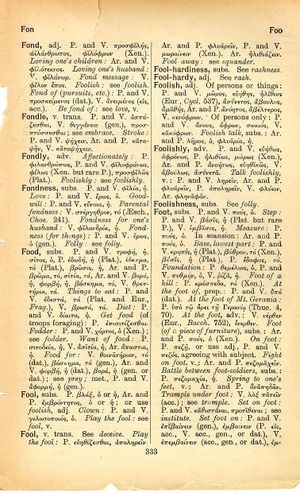fond: Difference between revisions
From LSJ
Κακὸν φυτὸν πέφυκεν ἐν βίῳ γυνή, καὶ κτώμεθ' αὐτὰς ὡς ἀναγκαῖον κακόν → In vita occrevit nobis ut gramen mulier, malumque hoc opus est servemus domi → Ein schlimm Gewächs erwuchs im Leben uns die Frau, und wir besitzen sie als unumgänglich Leid
(Woodhouse 3) |
(CSV4) |
||
| Line 1: | Line 1: | ||
{{ | {{Woodhouse1 | ||
| | |Text=[[File:woodhouse_333.jpg|thumb|link={{filepath:woodhouse_333.jpg}}]]'''adj.''' | ||
P. and V. [[προσφιλής]], [[φιλάνθρωπος]], [[φιλόφρων]] (Xen.). | |||
<b class="b2">Loving one's children</b>: Ar. and V. [[φιλότεκνος]]. | |||
<b class="b2">Loving one's</b> <b class="b2">husband</b>: [[φιλάνωρ]]. | |||
<b class="b2">Fond message</b>: V. φίλον [[ἔπος]]. | |||
<b class="b2">Foolish</b>: see [[foolish]]. | |||
<b class="b2">Fond of</b> (pursuits, etc.): P. and V. προσκείμενος (dat.), V. ἀνειμένος (εἰς, acc.). | |||
<b class="b2">Be fond of</b>: see [[love]], v. | |||
}} | }} | ||
Revision as of 09:41, 21 July 2017
English > Greek (Woodhouse)
adj.
P. and V. προσφιλής, φιλάνθρωπος, φιλόφρων (Xen.). Loving one's children: Ar. and V. φιλότεκνος. Loving one's husband: φιλάνωρ. Fond message: V. φίλον ἔπος. Foolish: see foolish. Fond of (pursuits, etc.): P. and V. προσκείμενος (dat.), V. ἀνειμένος (εἰς, acc.). Be fond of: see love, v.

